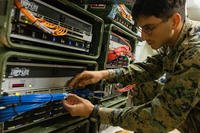The raid wasn't supposed to last 16 hours.
But the mission for the six airmen would ultimately be a heroic effort in which they entered hostile airspace to help rescue wounded comrades and recover critical intelligence components from the battlefield.
Two years after the first major special operations raid under the Trump administration, the airmen, part of the 67th Special Operations Squadron at the time, received Distinguished Flying Crosses last week for their actions in support of various tasks against terrorist operations under Operation Inherent Resolve, according to the Air Force. The awards were first reported by Air Force Magazine.
The crew members awarded in the ceremony included:
- Maj. Ross Biechler, Aircraft Commander
- Capt. Justin Nadal, Aircraft Co-Pilot
- Maj. Mary Spafford, Evaluator Combat Systems Officer
- Tech. Sgt. Adam Phelan, Evaluator Loadmaster
- Tech. Sgt. Samuel Haydon, Evaluator Loadmaster
- Staff Sgt. Christopher Jones, Instructor Loadmaster
While details of their exact mission the night of Jan. 28-29, 2017, remain scarce, the Air Force said the conditions were challenging.
The crew, dubbed ARSON 69, was piloting an MC-130J Commando II at the time of the mission.
They had worked to move 27 troops into the austere environment and refuel 25 aircraft, providing 64,000 pounds of fuel in a nearby location, according to an Air Force release about the mission.
The crew even worked to repair a damaged refueling hose in addition to responding to a downed MV-22 Osprey, according to the release.
"For 16 hours, in the face of multiple aircraft breaking down and deteriorating weather," Lt. Gen. Brad Webb, commander of Air Force Special Operations Command, said during the Jan. 22, 2019, ceremony at Hurlburt Field, Florida. "In the face of constantly changing plans, ARSON 69's tenacity, flexibility and determination made a difference."
The crew worked quickly to help "prepare for [a] nine service member crew casualty evacuation" and simultaneously to "recover … critical intelligence materials," the release said.
While Air Force officials did not specify the circumstances under which the MV-22 went down, the airmen's mission coincided with a Yemen raid that left a Navy SEAL and 30 local civilians dead and six more troops injured.
On the night of Jan. 28, 2017, Navy SEAL Team 6 fought and killed fighters of an al-Qaida affiliate in Yemen in a raid that left one of the team members dead, three wounded and three injured.
"These six airmen exhibit extreme competence that I think defines air commandos," Webb said. "Despite all the difficulties and despite all the chaos with the mission, they knew there was a way, and they were going to find it."
Related content:
- Two A-10 Pilots Awarded Distinguished Flying Cross for ISIS Fight
- Combat Controller Receives Air Force Cross for Valor in Afghanistan
- Crew of AC-130 Gunship Honored for Suppressing Taliban Ambush
Chief Special Warfare Operator William "Ryan" Owens, 36, of Peoria, Illinois, was killed during the Jan. 28 information-gathering operation. Owens was killed in the firefight in the remote village town of Yakla.
The Osprey suffered a hard landing while transporting troops and could not be flown out. It was destroyed in an airstrike.
The raid was planned in 2016 under the administration of former President Barack Obama, but was personally authorized by President Donald Trump in the first combat action he approved as the new commander in chief, the Pentagon said at the time.
"This is what I call the air commando standard," Webb said of the 67th, assigned to Royal Air Force Mildenhall, England. "When our joint partners work with us, this is what they should expect and this is what they get."
He added, "They get humble determination, extreme competence. They get tenacity, grit and determination to get the job done; they will get air commandos exactly like these six."
-- Oriana Pawlyk can be reached at oriana.pawlyk@military.com. Follow her on Twitter at @Oriana0214.














